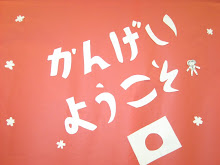Wednesday, April 14, 2010 A Block Two Day
JAPANESE 3 -- First period
This class does not meet during Block Two days.
JAPANESE 1 – Fifth period
WARNING: Personal conversations and excessive talking are unacceptable in Japanese class. Kimmel Sensei will soon be giving behavior referrals for such activities.
Handed out another katakana information sheet with stroke order for both katakana and hiragana.
Handout about the film “Yojimbo” from Wikipedia
Watch “Yojimbo.”
Homework:
1. Point of Interaction – summary of Yojinbo article
2. Bring the katakana handout again Friday to show that you have finished it.
Be sure to register with Japanese site on Moodle。
JAPANESE 2 Sixth Period
Wikipedia handout on the Kurosawa film “Yojimbo.”
Watch the film
Homework will be
1. summary of article
2. assignment from yesterday – see below
On Tuesday, students were given a handout about seasons, months and the school year and assigned to write more sentences for each month from April to August. This assignment will be collected on Friday. A list of kanji expressions, with pronunciations and meanings, was attached --
学年 季節
四月 春 学校が始まる
ゴルデン・ウイーク
五月 ゴルフ
梅雨、雨がよく降る
六月 夏
ペートンが終わる
ペートンは大阪に行く
七月 アメリカとフランスのたんじょう日
八月 高校の野球大会
四月に コアラ は メキシコ の 学校 に 行きました。
五月 の ゴルデン・ウイーク の 春 やすみ に 林とら は ゴルフ を しました。 お天気 は 雨 でした。
Write 3 more sentences for each month.
Important Kanji:
学年 がくねん The school year
季節 きせつ Season(s)
梅雨 ばいう Rainy season rain
雨 あめ Rain
降る ふる (Rain or Snow)falls
夏 なつ Summer
終わる おわる To end, finish
大阪 おおさか City of Osaka
高校 こうこう High school
野球 やきゅう Baseball
大会 たいかい Tournament
学校 がっこう School, in general
春 はる Spring
Be sure to register with Japanese site on Moodle。
Reminder: We all must be polite in the Japanese language classroom. Not only is it important in our lives in general – it is an essential part of Japanese culture. ください、おねがい します、ありがとう、すみません Are the most important words and phrases in Japanese.
JAPANESE 4 and AP – Seventh period
****AP JAPANESE PRACTICE TEST
will take place at 5 p.m. on Saturday, May 1st, in room 114.
We will order pizza and drinks to sustain us.*****
Handed out “basics” for chapter 7 in “A Homestay in Japan.” Verbally reviewed true and false questions on page 73. Vocabulary test on this chapter will take place next Monday.
Went over pages 224 and 225 in Nakama, the reading about “Privacy,” and carefully explained grammar and structure.
Next week, on the Block Two day, Johnny C., Amy Z., and Tommy Y. will give their oral presentations. [“Presentation should be 4 minutes long – they are big topics. AP and 4th year people should supply Japanese vocabulary lists to everyone in the class. Students may speak from notes, but not from text-with-sentences.”]
Cultural topics chosen for upcoming presentations – 四年生の日本語の生徒、英語で(But with 単語のリスト)――AP の生徒、日本語で (単語のリスト)
Jenny J. – “Self, family, and friends”
Connie Y – “leisure – traditional arts, hobbies, and sports)
Tommy Y – “Nature and environment”
Amy Z – “School and education”
Mike S – “Clothing, 和服、洋服)”
Azrieal W – “Communication and media”
Elizabeth A – “Technology – internet, private and public phones, cell phones”
Lalita A – “Rites of life – weddings, funerals, gift exchanges, letters”
Anton H – “Transportation – Japanese trains, buses, bicycles, cars”
Johnny C – “Shopping – kinds of stores, vending machines, Jpn money”
Jerome M – “Folklore, traditional culture, legends and stories”
Handout on Kurosawa's "Yojimbo" and viewing of film.
Homework
1. write summary of handout.
2. bring all books to class every day!
3. continue to work with "Strive for a Five"
Jerome-kun found outstanding website for watching and listening to Japanese weather forecasts:
http://weathernews.jp
Useful website for vocabulary: search for Denshi Jisho in Google, has vocab and also information on each kanji constituting a word.
REMINDER: In doing high school assignments or college assignments or tasks out in the world, every one of us should be trying to do the best and most complete work possible, not the least possible.
You might like to work with the following kanji-learning website:
http://www.jpf.org.uk/language/kanjifiles/kanjicard.html
About Me

- O.Kimeru
- M.A. 1992 from U. of Chicago; Japan Foundation Fellow in 1987-88; research fellow Yokohama City University; Japanese language teacher since 1991; also taught French (member American Association of Teachers of French), English as a Second Language (to students), methodology of teaching ESL (to Japanese high school teachers), English, Japanese history/culture, drama; in 2002 and 2004, listed in Who's Who Among America's Teachers; member of Chicago Sister Cities Osaka Committee, and chair of its Education Sub-Committee; vice-president Illinois Association of Teachers of Japanese; Payton H.S. World Language Department Chair from 2003-2007, under founding principal Mrs. Gail Ward; taught Japanese and coordinated Japan Exchange at Payton from 2003 to 2010; Japanese teacher at Burr Public School beginning August, 2010
Followers
Blog Archive
-
▼
2010
(88)
-
▼
April
(15)
- April 30, 2010 An Eight Period Day
- Friday, April 30, 2010 An Eight Period Day ...
- April 27, 2010 A Block Two Day
- April 26, 2010 A Block One Day
- April 23, 2010 An Eight Period Day
- April 22, 2010 April 2010 Newsletter for J...
- April 21, 2010 A Block Two Day
- April 20, 2010 A Block One Day
- April 16, 2010 An Eight Period Day
- April 14, 2010 A Block Two Day
- April 13, 2010 A Block One Day
- April 8, 2010 An Eight Period Day
- April 7, 2010 A Block Two Day
- April 6, 2010 A Block One Day
- April 5, 2010 An Eight Period...
-
▼
April
(15)